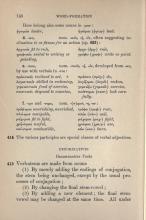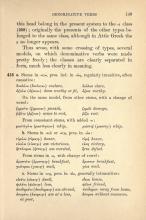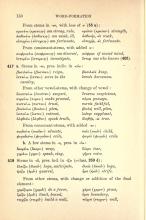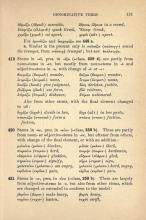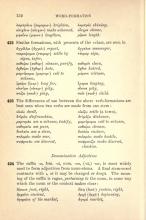415. Verb-stems are made from nouns:
1. By merely adding the endings of conjugation, the stem being unchanged, except by the usual processes of conjugation;
2. By changing the final stem-vowel;
3. By adding a new element; the final stem vowel may be changed at the same time. All under this head belong in the present system to the -ι class (§ 259); originally the presents of the other types belonged to the same class, although in Attic Greek the -ι- no longer appears.
Thus arose, with some crossing of types, several models, on which denominative verbs were made pretty freely; the classes are clearly separated in form, much less clearly in meaning.
416. a. Stems in -ο:ω, present indicative in -όω, regularly transitive, often causative:
| δουλό-ω (δουλο:ω-) enslave |
δοῦλος slave |
| ἀξιό-ω (ἀξιο:ω-) deem worthy or fit |
ἄξιος worthy |
On the same model, from other stems, with a change of vowel:
| ζημιό-ω (ζημιο:ω-) punish |
ζημίᾱ damage |
| ῥιζό-ω (ῥιζο:ω-) cause to root |
ῥίζα root |
From consonant stems, with added -ο:
| μαστῑγό-ω (μαστῑγο:ω-) whip |
μάστιξ (μαστῑγ-) whip |
b. Stems in -α:ᾱ or -α:η, present in -άω:
| τῑμά-ω (τῑμα:η-) honor |
τῑμή honor |
| νῑκά-ω (νῑκα:η-) am victorious |
νῑ́κη victory |
| ἡττά-ομαι (ἡττα:η-) am worsted |
ἧττα defeat |
From stems in -ο, with change of vowel:
| ᾱ̓ριστά-ω (ριστα:η-) breakfast |
ᾱ̓́ριστον breakfast |
| γοά-ομαι (γοα:η-) wail |
γόος wail |
c. Stems in -ε:η, present in -έω, generally intransitive:
| οἰκέ-ω (οἰκε:η-) dwell |
οἶκος house |
| φιλέ-ω (φιλε:η-) love |
φίλος friend |
| ἀποδημέ-ω (ἀποδημε:η-) am abroad |
ἀπόδημος away from home |
| ἀπορέ-ω (ἀπορε:η-) am at a loss, or poor |
ἄπορος without resources |
From stems in -εσ, with loss of σ (§ 55.a):
| κρατέ-ω (κρατε:η-) am strong, rule |
κράτος (κρατεσ-) strength |
| ἀσθενέ-ω (ἀσθενε:η-) am weak, ill |
ἀσθενής, -ές weak |
| εὐτυχέ-ω (εὐτυχε:η-) am fortunate |
εὐτυχής, -ές fortunate |
From consonant stems, with added -ε:
| σωφρονέ-ω (σωφρονε:η-) am discreet |
σώφρων of sound mind |
| ἱστορέ-ω (ἱστορε:η-) investigate |
ἵστωρ one who knows (§ 405) |
417. a. Stems in -ευ, present indicative in -εύω:
| βασιλεύ-ω (βασιλευ-) reign |
βασιλεύς king |
| ἱππεύ-ω (ἱππευ-) serve in the cavalry |
ἱππεύς horseman |
From other vowel stems, with change of vowel:
| ὑποπτεύ-ω (ὑποπτευ-) suspect |
ὕποπτος suspicious |
| πορεύ-ω (πορευ-) make proceed |
πόρος passage |
| πιστεύ-ω (πιστευ-) trust |
πιστός faithful |
| βουλεύ-ω (βουλευ-) plan |
βουλή will, plan |
| ἱκετεύ-ω (ἱκετευ-) entreat |
ἱκέτης suppliant |
| ἀληθεύω (ἀληθευ-) speak truth |
ἀληθής, -ες true |
From consonant-stems, with added -ευ:
| παιδεύ-ω (παιδευ-) educate |
παῖς (παιδ-) child |
| φυγαδεύ-ω (φυγαδευ-) exile |
φυγάς (φυγαδ-) exile |
b. A few stems in -υ, present in -ω:
418. Stems in -ιδ, present indicative in -ίζω (ι-class, § 259.d):
| ἐλπίζω (ἐλπιδ-) hope, anticipate |
ἐλπίς (ἐλπιδ-) hope |
| ἐρίζω (ἐριδ-) quarrel |
ἔρις (ἐριδ-) strife |
From other stems, with change or addition of the final element:
| χαρίζομαι (χαριδ-) do a favor |
χάρις (χαριτ-) grace |
| ὁρίζω (ὁριδ-) limit, bound |
ὅρος boundary |
| τειχίζω (τειχιδ-) build a wall |
τεῖχος (τειχεσ-) wall |
| ἀθροίζω (ἀθροιδ-) assemble |
ἄθροος, ἅθροος in a crowd |
| ἑλληνίζω (ἑλληνιδ-) speak Greek |
Ἕλλην Greek |
| χωρίζω (χωριδ-) set apart |
χωρίς (adv.) apart |
For ἐμποδίζω and διαχειρίζω see § 448.a.
a. Similar in the present only is σαλπίζω (σαλπιγγ-, sound the trumpet) from σάλπιγξ (trumpet); but aorist ἐσάλπιγξα.
419. Stems in -αδ, present in -άζω (ι-class, § 259.d), are partly from noun-stems in -ατ, but mostly from noun-stems in -ᾱ and adjective-stems in -ο, with change of -ᾱ or -ο:
| θαυμάζω (θαυμαδ-) wonder |
θαῦμα (θαυματ-) wonder |
| ὀνομάζω (ὀνομαδ-) name |
ὄνομα (ὀνοματ-) name |
| δικάζω (δικαδ-) give judgment |
δίκη decision, justice |
| βιάζομαι (βιαδ-) use force |
βίᾱ violence |
| ἀτῑμάζω (ἀτιμαδ-) dishonor |
ἄτῑμος unhonored |
Also from other stems, with the final element changed to -αδ:
| διχάζω (διχαδ-) divide in two |
δίχα (adv.) in two parts |
| στασιάζω (στασιαδ-) form a faction |
στάσις (στασι-) faction |
420. Stems in -αν, present in -αίνω (ι-class, § 259.b). These are partly from noun— or adjective— stems in -αν, but oftener from others, with change of the final element, or with an addition:
421. Stems in -υν, present in -ῡ́νω (ι-class, § 259.b). These are largely from adjective-stems in -υ, but also from other stems, which are changed or extended to conform to the model:
422. Similar formations, with presents of the ι-class, are seen in
423. The differences of use between the above verb formations are best seen when two verbs are made from one stem:
| οἰκέω dwell |
οἰκίζω settle (a town) |
| ἀτῑμόω disfranchise |
ἀτῑμάζω dishοnor |
| μαρτυρέω am a witness, testify |
μαρτῡ́ρομαι call to witness |
| καθαρεύω am pure |
καθαίρω cleanse |
| δουλεύω am a slave |
δουλόω enslave |
| πολεμέω make war |
πολεμόω make hostile |
| σωφρονέω am discreet |
σωφρονίζω make discreet, chastise |

